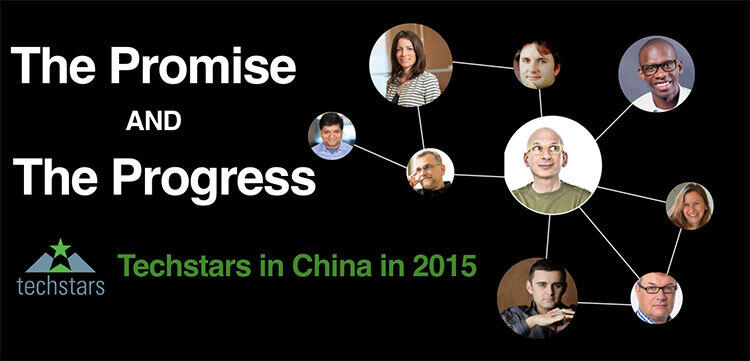
2015 was the first, full year for official Techstars activities and business in Greater China. It was a year full of challenges but also many great acheviements. As we look forward to 2016, let’s take a look at the progress we have made in Greater China in 2015.
The Promise: Helping Startups Get to the Next Step
In November 2014, I gave a short presentation at a meetup in Chengdu about my vision for our programs in China. After sharing some info about each of our programs like Startup Weekend and Startup Next, I concluded with a promise: In 2015, we would bring at least least one company from China to the United States. It was a bold promise all things considered, and many at that meetup probably thought we would never deliver.
Across all of our events and programs, this remained our defining objective: help entrepreneuers take the necessary steps level up their startups and businesses.
I’m proud to say we achieved this goal at least once this past year through one of the “graduates” of our first Startup Next in Shanghai: PartnerGo. I’ll share more about their story later.
In brief, 2015 was the year we launched official operations for Startup Weekend and Startup Next in Greater China. This began under the banner of UP Global and a very clear initial mission. Having achieved our initial objectives, namely sponsorship goals, it morphed into a larger strategy. With the acquisition of UP Global with Techstars, our mission joined theirs, and we were given the opportunity to delivery more awesomeness with the Techstars Accelerator team.
Like our review from June, let’s take a look at our top achievements from the past year.
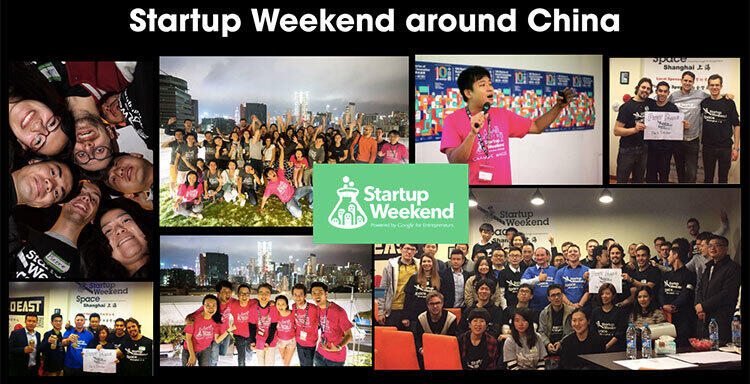
1: Increased Startup Weekend’s Impact, Focus and Quality in China
In 2015, we held 53 events in China, including 22 Startup Weekends and 29 pre-events, workshops, social hours, and training sessions. Officially we ran these events across 10 cities in China. Combined, these events reached over 6000 entrepreneurs.
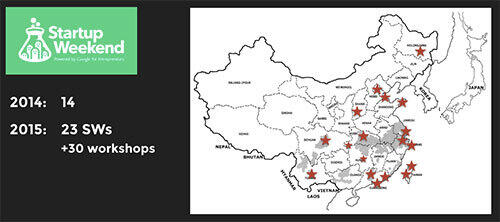
In 2015, we focused on China’s major startup hubs: Beijing, Shanghai, Hong Kong, Taipei, and Hangzhou. 71% of programs were held in these cities (38 of our 53 programs). We avoided the temptation of expanding into lesser developed cities, since a major part of our strategy has been building up our following and network in these hubs, in particular with high quality mentors, partners and top startups.
China’s startup situation is quite unique. I’ve written pretty extensively about startup communities in China. While China had a lot of energy and resources going into startups in 2015, it also presented a huge “bubble” of sorts as all kind of characters joined the “startup supporters” game. Unfortunately, as a foreign brand program, we met lots of special challenges that local supporters don’t have to deal with.
Specifically, in 2015, we were greeted by a huge increase of copycat and imitation Startup Weekend programs. This is a testament to our success and timing. It’s also indicative of the association in Chinese startup supporters between running events and building a startup ecosystem. While events are part it, events and programs need clear goals. Otherwise we merely provide places for people to spend their free time without building skills, connections, momentum and progress.
I’m happy to say that we’ve taken strong steps in Beijing, Hong Kong, Shanghai, Taipei, and Hangzhou over the last year by hosting strong traditional startup weekends, unique vertical-focused startup weekends and our later stage Startup Next programs. We’ve also hosted interesting regional events in other cities like Ningbo, Chengdu, Qingdao and even Xi’an.
Compared to the 14 events we hosted in 2014, 2015 was a big growth year as we grew to 53 events. This combined with a strong focus on quality and strategic partnerships. Overall, we reached more of the right people and delivered high quality engagement. Expect to hear more from these startups and entrepreneurs in the coming year.
2: Established Sponsorships and Partnerships for Startup Programs in China
In order to help startups, we have to be a successful and sustainable business ourselves. Prior to 2015, we had no national sponsors in Greater China. Combined with high variation in quality and program engagement, we did not have a clear understanding of existing partnerships as well as how to find and on-board new partners.
Partnerships has been our biggest challenge and opportunity in China. Expanding to China was not without a number of unique questions. Without partners, we could not build up our brand nor leverage our international network locally.
So, largely 2015 was a year of building relationships with the right people and partners. We were extremely fortunate in 2015 to have secured several financial sponsors to help us make us sustainable and also to help entrepreneurs in our network. A special thanks to:
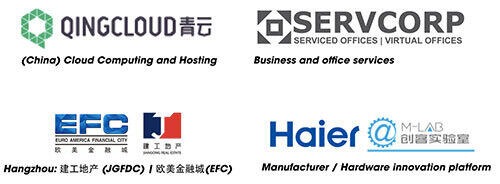
- Qingcloud: Qingcloud provides high quality cloud hosting in China and abroad. They are highly scalable and got a number of high profile clients. They provide trial credits to all Startup Weekend China participants and prizes to event winners.
- Servcorp: Servcorp provides serviced office space around the world. We’ve partnered with them to provide local winners with part-time space for their new projects and teams.
- EFC: EFC is based in Hangzhou and is focused on bringing innovation and startup culture to Hangzhou. They are a real estate developer, pivoting into creative startup focused spaces. They are a huge supporter of ours in Hangzhou.
- Haier M-Lab: As a subproject of one of China’s most well-known manufacturing brand, Haier M-Lab is a national sponsor for Startup Weekend and exclusive cooperation partner for Startup Weekend Youth Maker.
Beyond these national sponsors, we were fortunate to work with several sponsors and partners in developing vertical programs. The China Space Foundation was critical in helping us deliver the first ever Asian Startup Weekend Space in Shanghai in 2015. Haier and its associated companies helped us launch a Startup Weekend Maker in Qingdao, and in Ningbo, local supporters like NexMaker and WuKa Coffee helped bring Startup Weekend Maker to Ningbo too. JD.com PowerUp has joined us in helping bring more IoT focused innovation.
One of our oldest and longest serving partners has been Bob Zheng and People Squared, which is a network of startup friendly co-working spaces in Shanghai and Beijing (so far). People Squared hosted Startup Weekends in Beijing and Shanghai as well as our first Startup Next in Shanghai.
Beyond these companies, we’ve been fortunate to have a number of local partners helping us.
3: Successfully Launched Startup Next in Shanghai and Hong Kong
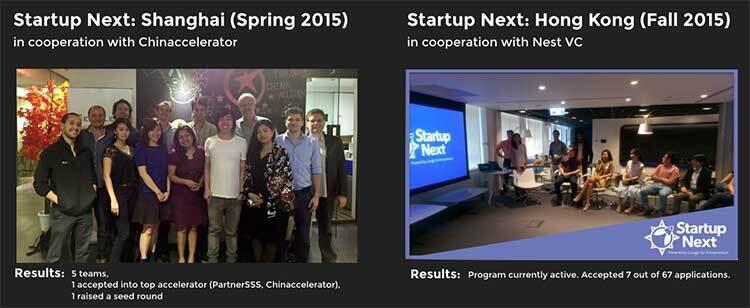
In November 2014 when I made my promise to help bring at least one China-based startup to the US via one of our programs, my main target was Startup Next. Startup Next is our 6-week pre-acceleration program.
In 2015, we ran 41 startup next programs around the world. I’m happy to say we ran two successful startup next programs in Greater China last year, namely in Shanghai and in Hong Kong. We will be continuing both these programs this Spring 2016 and we are expanding to additional cities as well.
Both programs in Shanghai (Spring 2015) and Hong Kong (Fall 2015) brought a truly high-level experience to the teams selected. Through a competitive application process, we selected 5 teams in Shanghai and 7 in Hong Kong. Each program had a number of high quality mentors and speakers to guide teams throughout.
Both were guiding by the underlying mission to provide next step opportunities beyond Startup Weekend and strategic help to get startups into top accelerators.
4: Grew our Mentorship and Community Network in China
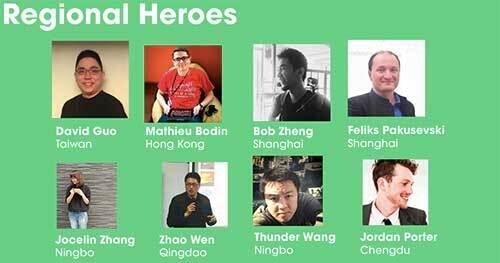
Techstars is, by definition, a mentorship-driven accelerator program. This emphasis on being mentorship-driven is also key to how we run our pre-accelerator programs. These programs aim to educate and accelerate entrepreneurs through a focused curriculum and learning process with the guidance of mentors and coaches.
One of the added challenges to growing our programs in China is the lack of a culture of mentorship. China is also not particularly strong culture of volunteerism. These two characteristics create some unique challenges.
Quite frankly we cannot scale and grow high quality programs without high quality mentors and partners. We depend on our local ecosystem to be successful. So, along with growing our programs, engagement, and participants, we also significantly grew our mentors and community.
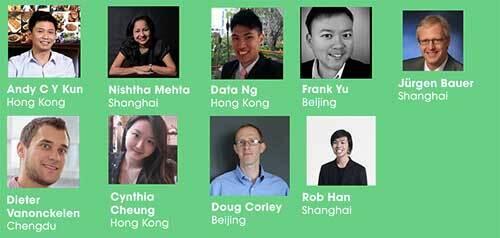
As a volunteer-led organization, a percentage of my time goes towards training the right kind of organizers and volunteers. Startup Weekend in particular is a massive effort by a collection of local volunteers and our network of officially trained facilitators. For many of our student run events, we’ve helped find mentors and judges too.
In 2015, we significantly grew the number of people involved in running and helping out at our programs. We increased the number of official facilitators in Greater China and added lots of first time organizers and mentors. This “people capital” is our biggest value and wealth.
Beyond any of these other achievements, I’m most proud of the great people we have involved now. From volunteers to mentors, we engaged more than 400 community leaders this past year.
A special thanks to our regional heroes!
5. From China to US: Bringing Entrepreneurs and Startups to the next level
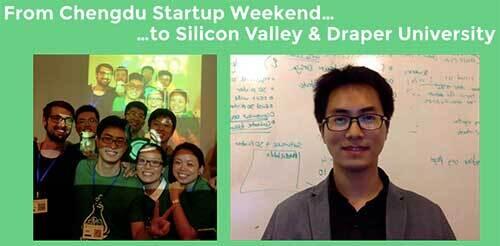
Ultimately we are driven to create and educate successful entrepreneurs. In the end, we will be judged by our ability to take these entrepreneurs and startups and help them create successful businesses. Each of our programs has a particular goal.
Regionally, our mission this past year has been to help at least one entrepreneur or startup from China get to the US. We were fortunate to have achieved at least two important successes this past year.
From Startup Weekend Chengdu, one of our participants spent several months working on their Startup Weekend project before finally giving it up. His dream didn’t die there though. He went on to apply and successful attend Draper University in Silicon Valley. Check out his full story and video here.
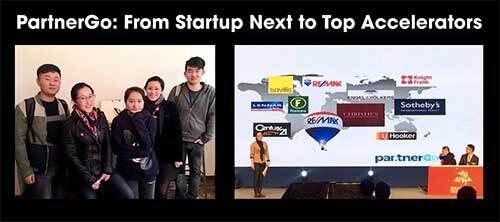
From Startup Next Shanghai, we had a number of strong teams. Each of these startups are still going strong with some having raised money and others having pivoted to a new focus. Our biggest success story was PartnerGo, which was founded by Tanya Cheung.
Tanya and her team joined Startup Next in Spring 2015. While she had gained some traction and early customers, she wasn’t sure about her next step or even how best to tell her story. Over the course of the program, Tanya and her project gained focus and confidence.
PartnerGo is an international real estate referral network. After graduating from Startup Next, the team was invited to join Chinaccelerator in Shanghai and received some additional funding. Over the course of that program, PartnerGo has grow as a team and company, including relaunching their online platform and marketing.
After a year of progress and successes, PartnerGo is one of 12 teams invited to attend Techstars’ Startup Next Demo Day at CES in Las Vegas. They join only one other team from Asia from Mumbai. We truly did deliver on our promise this past year with the help of our mentors and passionate entrepreneurs. Check out the full story of PartnerGo at TechInAsia.
Entrepreneurship is a long-term project. Few results happen overnight. Over the last year, we’ve significantly grown our community of people and seen a few startups get to the next level. Many are still hard at work, and we can’t wait to watch more of these people go onto to greatness in the coming months and years.
Conclusion: Helping Entrepreneurs in and into China in 2016
With the merger of UP Global and Techstars, we now have a mature suite of programs and network of people to help startups and founder go from inspiration to investment and beyond. Through a “curated” network of mentors, startups and community leaders, we truly are an international force providing an “unfair advantage” to startups.
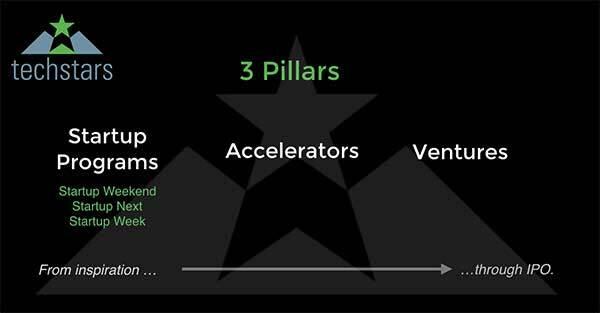
At Techstars, our mission is to be a “global ecosystem that helps entrepreneurs build great businesses.” This means businesses and founders anywhere in the world, not just in Silicon Valley. This distributed regional focus is a strong part of our vision internationally.
In China, we have been working hard to grow our connections and programs. We’ve achieved a lot of great things in 2015. Now with the combined force of Techstars and affiliated companies, we are working hard to help Techstars companies come to China.
Whether it’s manufacturing or expanding sales and marketing or seeking investment, China is one of the most important ecosystems for startups now and in the future. It’s not to be ignored. Over the last several months, we’ve already been helping Techstars companies navigate China. This is one of those areas where being part of Techstars provides unique opportunities for founders. We can’t wait to do more of this in 2016.
We recognize the challenges of operating in China. At the same time, we believe that the ingredients of a strong ecosystem for startups can be found, cultivated and maintained in China. In 2016, expect more awesome programs, more high quality mentors and additional opportunities for startups in and into China.
Thanks again to all of our regional and international supporters. We look forward to another great year in 2016!
